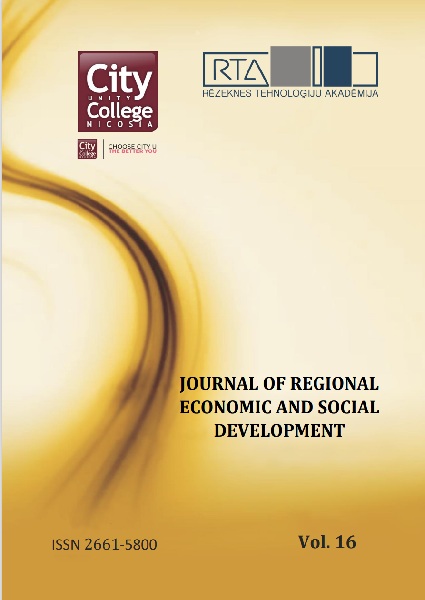IMPROVING CYPRUS FIRE SERVICE PERFORMANCE THROUGH MODERN HR MANAGEMENT PRACTICES AND JOB SATISFACTION
DOI:
https://doi.org/10.17770/jresd2024vol16.8326Keywords:
employee satisfaction, fire service transformation, human resource management, job satisfaction, National Security Force, service quality, workforce managementAbstract
Purpose and aim of the study: This study investigates the relationship between staff job satisfaction and the transformation of the Cyprus Fire Service into a modern and flexible National Security Force. The primary aim is to analyse organizational and human resource management theories and their application to enhance the efficiency and effectiveness of fire operations.
Design / Methodology / Approach: The research employs a quantitative approach, utilizing a survey conducted with 110 members of the Cyprus Fire Service. The survey assesses job satisfaction and its impact on service quality. The data were collected using a structured questionnaire and analysed using statistical methods, including descriptive, frequency, and correlation analyses.
Main Findings: The findings reveal a strong positive correlation between employee satisfaction and service quality. Satisfaction influences service quality both directly and indirectly. The study highlights that job satisfaction encompasses various factors, including salary, promotions, and management practices.
Originality: This research is original in its focus on transforming the Cyprus Fire Service by applying modern management principles. It provides insights into how job satisfaction can be leveraged to improve organizational performance in public safety services.
Implications: The study suggests that enhancing job satisfaction can lead to improved service quality, which is crucial for the Fire Service's role in ensuring public safety. It proposes alternative strategies for personnel management by comparing successful systems from other EU Member Countries.
References
Armstrong, M., Taylor, S. (2023). A Handbook of Human Resource Management Practice, 16th ed., Kogan Page Publishing, London.
Aruldoss, A., Berube Kowalski, K., Travis, M. L., & Parayitam, S. (2022). The relationship between work–life balance and job satisfaction: Moderating role of training and development and work environment. Journal of Advances in Management Research, 19(2), 240-271.
Bakker, A. B., Demerouti, E., & Verbeke, W. (2004). Using the job demands‐resources model to predict burnout and performance. Human Resource Management: Published in Cooperation with the School of Business Administration, The University of Michigan and in alliance with the Society of Human Resources Management, 43(1), 83-104.
Barger, P. B., & Grandey, A. A. (2006). Service with a smile and encounter satisfaction: Emotional contagion and appraisal mechanisms. Academy of Management Journal, 49(6), 1229-1238.
Barling, J., Kelloway, E. K., & Iverson, R. D. (2003). Accidental outcomes: Attitudinal consequences of workplace injuries. Journal of Occupational Health Psychology, 8(1), 74.
Bitner, M. J. (1990). Evaluating service encounters: the effects of physical surroundings and employee responses. Journal of marketing, 54(2), 69-82.
Furnham, A., Eracleous, A., & Chamorro‐Premuzic, T. (2009). Personality, motivation and job satisfaction: Hertzberg meets the Big Five. Journal of managerial psychology, 24(8), 765-779.
Ghafoor, M. M. (2012). Role of demographic characteristics on job satisfaction. Far East Research Centre, 6(1), 30-45.
Kraimer, M. L., Seibert, S. E., Wayne, S. J., Liden, R. C., & Bravo, J. (2011). Antecedents and outcomes of organizational support for development: the critical role of career opportunities. Journal of applied psychology, 96(3), 485.
Ostrom, E., & Whitaker, G. P. (1974). Community control and governmental responsiveness: The case of police in black neighborhoods. Improving the Quality of Urban Management, 10(4), 303-34.
Rahman, K. S., & Simonson, J. (2020). The Institutional Design of Community Control. California Law Review, 108(3), 679-742.
Saari, L. M., & Judge, T. A. (2004). Employee attitudes and job satisfaction. Human Resource Management: Published in Cooperation with the School of Business Administration, The University of Michigan and in alliance with the Society of Human Resources Management, 43(4), 395-407.
Downloads
Published
Issue
Section
License
Copyright (c) 2024 Nikos Mardas, Constantinos Charalambous

This work is licensed under a Creative Commons Attribution 4.0 International License.


